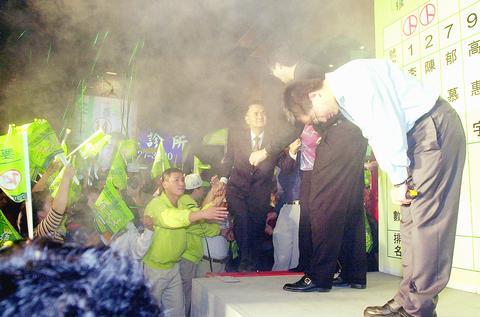The DPP got its wish: To become the largest party in the legislature.
By the time the ballot counting was finished yesterday, the party had captured 87 seats in the lawmaking body -- winning 36 percent of the vote. The DPP also replaces its arch rival the KMT as the largest party in the legislature.
Though the outcome is inadequate to secure the party majority control of the legislature, the results are expected to make it easier for President Chen shui-bian (

PHOTO: CHIANG YING-YING, TAIPEI TIMES
In the run-up to yesterday's polls, the main opposition parties painted the contest as a referendum on the Chen administration.
The KMT, swept from its long grip on power last year, finished a distant second with 73 seats, down from 123 in the previous legislative elections in 1998. The former ruling party had hoped to retain at least 85 seats, which would have allowed it more voice in the formation of a post-election Cabinet.
The KMT has been eyeing those Cabinet posts responsible for making the nation's economic and financial policy.
KMT Chairman Lien Chan (
While he made no mention if he or any other party official would step down to take responsibility for the KMT's poor showing in the polls, he did hint that he might have changed his mind on the idea of working with the DPP administration.
``We did not win,'' said Lien. ``But we are still the largest opposition party. We will step up negotiations with others, so we can together help stabilize politics.''
As anticipated, the elections confirmed the People First Party's (PFP) standing as the third largest party in Taiwan. The party bagged 46 seats with 20 percent of the votes, successful doubling its presence in the legislature.
The vote count, though impressive, was not enough to secure PFP Chairman James Soong (
The Taiwan Solidarity Union (TSU) emerged as a big winner, increasing its number of seats in the legislature from one to 13. The party also passed the 5 percent threshold needed to win legislator-at-large seats and campaign-matching funds.
But the DPP and TSU's seats are not enough to give the "pan-green" alliance the votes needed to overcome opposition resistance and pass the government's policy initiatives in the legislature.
The New Party was undoubtedly the biggest loser in the legislative races. The pro-unification party retained only one seat representing Kinmen, down from 11 in the 1998 polls.
The party failed to meet the 5-percent threshold, denying it the rights to claim legislator-at-large seats or form a caucus in the legislature.
Some New Party members have talked about rejoining the KMT to keep its pro-unification cause alive.
Not surprisingly, John Chang (章孝嚴), the illegitimate son of late president Chiang Ching-kuo (蔣經國) and a former foreign minister, won a seat from the southern district of Taipei City with 46,263 votes.
Other big-name candidates winning seats were the DPP's Lou Wen-chia (
A high percentage of incumbents lost their bid to win elections. They include New Party lawmakers Hsieh Chi-ta (

ACTION PLAN: Taiwan would expand procurement from the US and encourage more companies to invest in the US to deepen bilateral cooperation, Lai said The government would not impose reciprocal tariffs in retaliation against US levies, President William Lai (賴清德) said yesterday, as he announced five strategies to address the issue, including pledging to increase Taiwanese companies’ investments in the US. Lai has in the past few days met with administrative and national security officials, as well as representatives from various industries, to explore countermeasures after US President Donald Trump on Wednesday last week announced a 32 percent duty on Taiwanese imports. In a video released yesterday evening, Lai said that Taiwan would not retaliate against the US with higher tariffs and Taiwanese companies’ commitments to

‘SPECIAL CHANNEL’: Taipei’s most important tasks are to stabilize industries affected by Trump’s trade tariffs and keep negotiations with Washington open, a source said National Security Council Secretary-General Joseph Wu (吳釗燮) arrived in the US for talks with US President Donald Trump’s administration, a source familiar with the matter said on Friday. Wu was leading a delegation for a meeting known as the “special channel,” the Financial Times reported earlier. It marked Trump’s first use of the channel since returning to the White House on Jan. 20. Citing a source familiar with the matter, the Financial Times reported that Minister of Foreign Affairs Lin Chia-lung (林佳龍) was also a part of the delegation. The visit came days after China concluded war games around Taiwan and amid Trump’s

CHIP EXCEPTION: An official said that an exception for Taiwanese semiconductors would have a limited effect, as most are packaged in third nations before being sold The Executive Yuan yesterday decried US President Donald Trump’s 32 percent tariff on Taiwanese goods announced hours earlier as “unfair,” saying it would lodge a representation with Washington. The Cabinet in a statement described the pledged US tariffs, expected to take effect on Wednesday next week, as “deeply unreasonable” and “highly regrettable.” Cabinet spokeswoman Michelle Lee (李慧芝) said that the government would “lodge a solemn representation” with the US Trade Representative and continue negotiating with Washington to “ensure the interests of our nation and industries.” Trump at a news conference in Washington on Wednesday announced a 10 percent baseline tariff on most goods

Intelligence agents have recorded 510,000 instances of “controversial information” being spread online by the Chinese Communist Party (CCP) so far this year, the National Security Bureau (NSB) said in a report yesterday, as it warned of artificial intelligence (AI) being employed to generate destabilizing misinformation. The bureau submitted a written report to the Legislative Yuan in preparation for National Security Bureau Director-General Tsai Ming-yen’s (蔡明彥) appearance before the Foreign Affairs and National Defense Committee today. The CCP has been using cognitive warfare to divide Taiwanese society by commenting on controversial issues such as Taiwan Semiconductor Manufacturing Co’s (TSMC, 台積電) investments in the